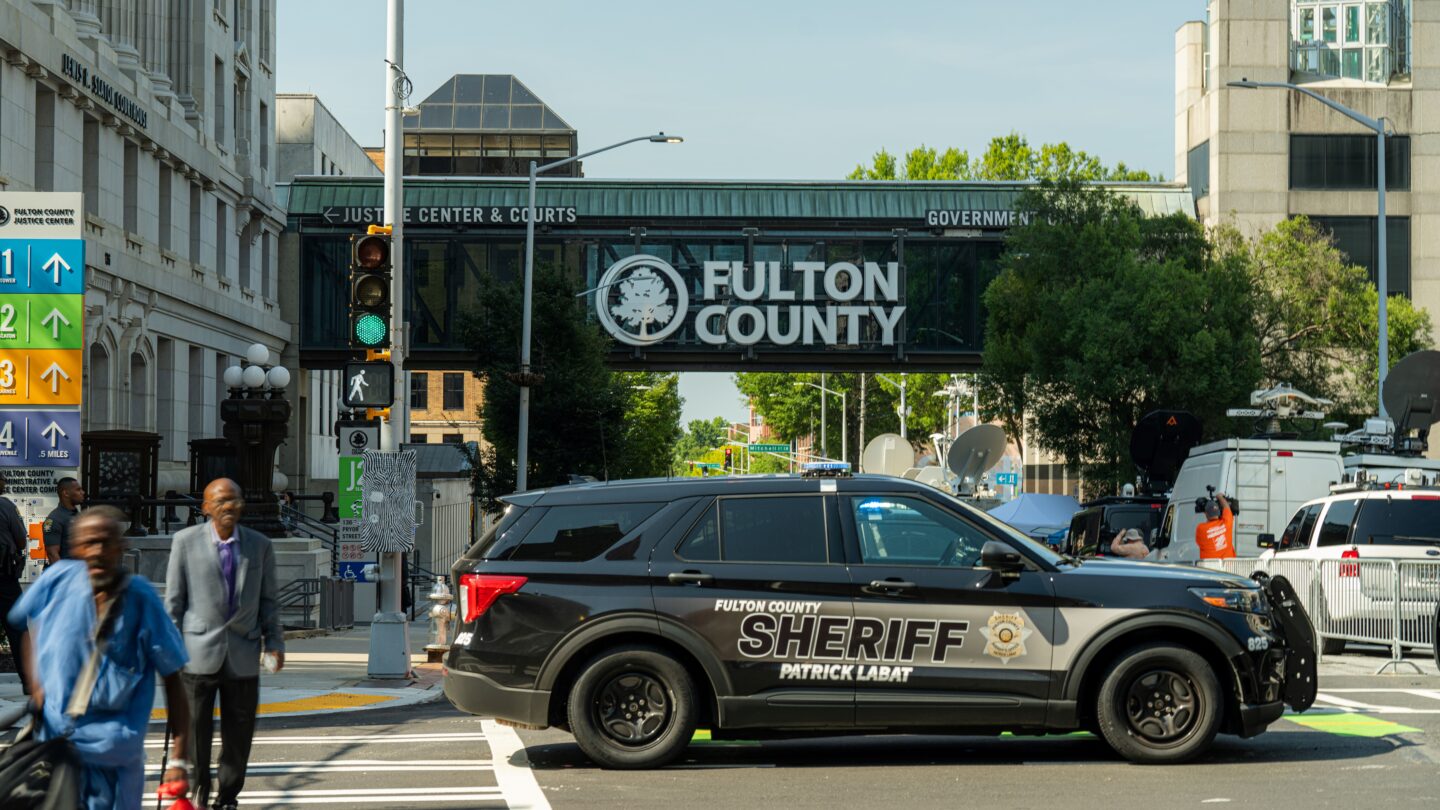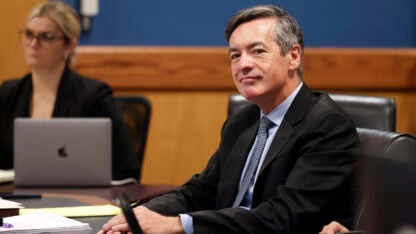With Donald Trump’s not guilty plea on Thursday, the Georgia election interference case may be entering its most frenzied period yet, as the conflicting legal strategies of 19 co-defendants and the crowded calendar for the former president’s other court cases complicate the path to trial.
All defendants will enter their pleas by Wednesday. Then the potential courses ahead get complex.
Several defendants are seeking to have their cases tried in federal court. Two defendants moved for a speedy trial to occur this fall. And some want their cases severed from others so they can move at their own pace.
“We’re in a huge state of flux right now,” says criminal defense attorney Bob Rubin. “Because the case involving these 19 defendants seems to be going in a lot of different directions all at the same time and that’s very unusual.”
Removal to federal court
U.S. District Judge Steve Jones is weighing whether former White House Chief of Staff Mark Meadows can have his Georgia criminal case tried in federal, rather than state, court.
Taking the witness stand on Monday, Meadows claimed the activities outlined in the indictment fell under his official duties as White House chief of staff, meaning he has a right to remove his case to federal court.
If Meadows is successful, one likely benefit to him would be a broader, more Republican-leaning jury pool, as jurors would come from 10 counties in northern Georgia, not just heavily Democratic Fulton County.
Anthony Michael Kreis, a law professor at Georgia State University, says there’s another potential benefit for Meadows.
“At the end of the day, if Mark Meadows was able to show he was acting entirely consistent with what the federal law authorized him to do, then he has a very strong case to suggest the Constitution’s Supremacy Clause renders any prosecution by the state of Georgia null and void,” Kreis says.
In other words, Meadows may try to claim immunity from prosecution because the state of Georgia can’t criminalize conduct the federal government explicitly allows.
Former U.S. Justice Department official Jeffrey Clark is also seeking to have his case tried in federal court. So are David Shafer and Cathy Latham, who falsely claimed to be official electors for the state, though most legal experts agree their effort is a stretch.
Trump may also try a similar move. His lead counsel, Steven Sadow, observed Meadows’ Monday hearing from the gallery.
But first, Judge Jones will need to weigh whether Meadows’ activities — like offering campaign funding to a Georgia official to speed up a signature audit, sending an email referring to the coordination of fake electors, and facilitating Trump’s phone call asking Georgia Secretary of State Brad Raffensperger to “find” votes — really were part of his official duties.
Fulton County prosecutors argue that those actions could not have been under the scope of Meadows’ White House job. The Hatch Act restricts federal officials from engaging in campaign activity in their official capacity, though Meadows denies that’s what he was doing.
Kreis says this debate could reach the U.S. Supreme Court on appeal, and how the conservative-leaning court would rule is not clear.
“The right of states as sovereign entities to prosecute crimes without federal courts intervening, that’s something generally conservatives would agree with,” Kreis says. “At the same time, conservatives particularly have a broad view of executive power.”
It’s also uncertain whether an order removing one defendant’s case would drag all the other defendants along to federal court as well, meaning the decision on Meadows could have implications for the entire case.
Speedy trial
Meanwhile, defendants Kenneth Chesebro and Sidney Powell, both lawyers for Trump after the 2020 election, have moved for a “speedy trial.”
Georgia law allows defendants to demand a trial within the same term of court as their indictment was handed up, or in the following one.
Fulton Superior Court Judge Scott McAfee, who’s presiding over the case, has set Chesebro’s trial date for Oct. 23. Powell’s request is pending.
Rubin says the most common reason to call for a speedy trial is for a client who is detained in jail, awaiting trial without bond. In this case, avoiding a lengthy trial with 19 co-defendants may reduce some legal fees.
“You can file a speedy trial demand because you don’t think the state’s ready, or you think a witness is missing,” Rubin says, but usually “the axiom among defense lawyers is delay, delay, delay. Typically, the longer a case takes to get to trial, the better off defendants are.”
With conflicting strategies coming together, it’s murky what a speedy trial for two defendants means for the 17 others, who may want to delay the trial.
Fulton County District Attorney Fani Willis has pledged to try all 19 Georgia defendants together in a sweeping racketeering case — and says she is ready to take the entire case to trial on Oct. 23, though many defense lawyers have said that is unlikely, due to the logistics alone.
“It is such a huge paper case, I mean terabytes of documents will be produced to the defendants,” Rubin says. “So it’s going to be really hard for some of the defendants to get ready and go through all the discovery by an October trial date.”
Severability
Chesebro and Powell have also asked a judge to sever their cases from their co-defendants. And in turn, Trump is asking the judge to sever his case from Chesebro and Powell to avoid going to trial with them this fall.
Severance could complicate things for prosecutors, who have built their case around Georgia’s RICO law, which requires demonstrating how multiple people conspired to commit or solicit specific criminal activity to advance a common goal.
“You still have to tell the whole story, whether you’re trying two of the 19 defendants or 19 of the 19 defendants,” says Rubin, who represented a defendant in the Atlanta Public Schools cheating scandal famously prosecuted by Willis as a RICO case.
“They’re essentially going to be trying [Trump] and the others who aren’t there in absentia,” Rubin says of Chesebro and Powell going to trial before the others.
“In telling the story and putting up evidence of how President Trump made a phone call to Brad Raffensperger and how [defendant] Scott Hall flew to Coffee County and was there when the voting machines were accessed, they’re still going to put up witnesses about those events,” he says.
At this stage, individual motions for federal removal, speedy trial and severance are all converging and it’s not clear how they will be settled or how they will affect the larger case.
Meanwhile, Trump’s calendar is filling up, with a judge scheduling his related federal election interference case for trial in early March 2024 — when Willis had initially hoped to bring her case to trial.
This moment underscores the challenges of prosecuting a sprawling case with 19 co-defendants, Rubin says, compared to special counsel Jack Smith’s narrowly tailored federal case that is focused on Trump alone.
“There’s multiple problems and we’re seeing some of them play out,” Rubin says. “It gives an opportunity for the defendants to file motions and run the state around in circles. They’re going to be stretched really thin to handle all of this together in a cohesive way.”

9(MDAxODM0MDY4MDEyMTY4NDA3MzI3YjkzMw004))








